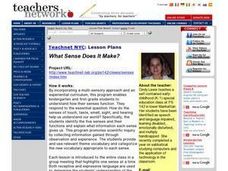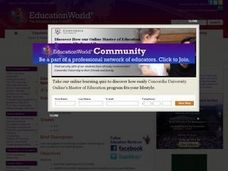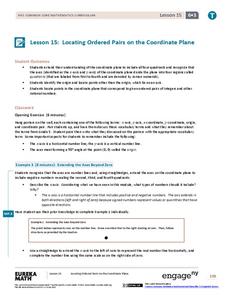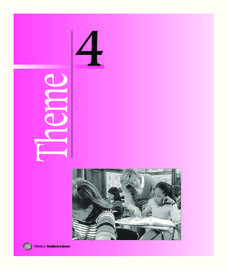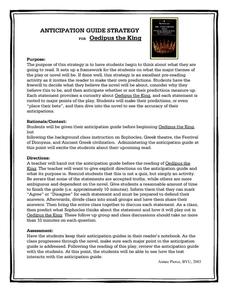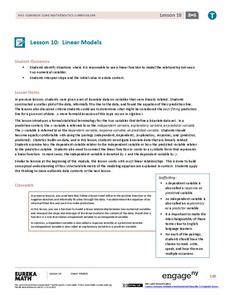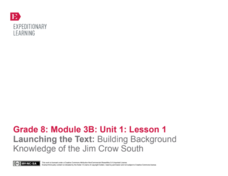Curated OER
What Sense Does It Make?
Students identify the five senses and their functions and explain what information each sense gives us. They collect information gained through observation and experiences. They practice identifying new vocabulary words from the word wall.
Curated OER
Cooperative Group Spelling Game
Partners or groups work together to practice the correct spelling of words. They speed-cut letters from print sources and arrange them into correctly spelled words from their lists. Newspapers are suggested, but magazines might result in...
EngageNY
Locating Ordered Pairs on the Coordinate Plane
Four quadrants, four times the fun. Future mathematicians learn the terminology associated with the coordinate plane and how to plot points in all four quadrants. A worksheet tests their understanding of the material in the 16th...
Goodwill Community Foundation, Inc.
Meeting New People
Find out your conversation partner's name, job, place of origin, and current residence with a straightforward Spanish practice guide. Learners click on audio icons to hear the proper pronunciation of ¿Como te llamas? and ¿De...
Curated OER
Simple Inequalities
Students solve inequalities. In this inequalities lesson, students evaluate simple inequalities. They examine vocabulary words. Students participate in breath holding activities and write inequalities to represent the activity. In teams,...
K12 Reader
Prepositional Phrases II
Hidden within these sentences are prepositions; think your students can find them? After first reading a brief explanation of this part of speech, young grammarians are asked to examine eight sentences,...
Curated OER
Computer Parts
Young scholars observe PowerPoint presentation explaining the parts of a computer and discuss the monitor, keyboard, mouse and CPU unit. They create index cards, with definitions and place them on the word wall. Individually, students...
Cornell University
Insect Anatomy
Young entomologists discover insect anatomy in a very detailed unit plan. Offering background information for teachers about various insects, class members explore the differences between bugs and insects—and yes, there are many...
Houghton Mifflin Harcourt
Problem Solvers: English Language Development Lessons (Theme 4)
How can you teach a text to a group of readers who struggling with the language? The second in a set of three ESL lessons related to Theme 4: Problem Solvers engages English language learners by introducing vocabulary and grammar...
Novelinks
Oedipus the King: Anticipation Guide
Is it possible to escape fate? Are all types of pride evil? Are family secrets best kept secret? Before reading Oedipus the King, class members respond to a series of statements on an anticipation guide that introduces some of the basic...
EngageNY
Linear Models
Expand your pupils' vocabulary! Learn how to use statistical vocabulary regarding linear models. The lesson teaches scholars the appropriate terminology for bivariate data analysis. To complete the module, individuals use linear...
Cornell University
Study Soil
What's in soil? Young scientists study the pH levels of soil from their school yard. They observe the land and area the soil came from to decide if location has anything to do with acidity level.
EngageNY
Writing and Expanding Multiplication Expressions
Find out what's so standard about standard form. Scholars learn to write multiplication expressions with variables in the 10th lesson in a series of 36. They use different symbols for multiplication and translate between standard and...
EngageNY
Modeling with Inverse Trigonometric Functions 1
Where should I stand to get the best view? Pupils use inverse trigonometric functions to determine the horizontal distance from an object to get the best view. They round out the lesson by interpreting their answers within context.
Good Project by Harvard Project Zero
The Good Project Lesson Plans
Excellence, ethics, and engagement are the three E's featured in a unit that promotes good work among elementary scholars. Through discussion, reflection, read-alouds, activity worksheets, and written responses, participants gain...
EngageNY
Launching the Text: Building Background Knowledge of the Jim Crow South
Pictures and photographs help build background knowledge about a topic. Scholars participate in a gallery walk to learn more about the Jim Crow era of US history and the desegregation of schools following Brown v. Board of Education....
EngageNY
Close Reading: Understanding Carlotta’s Journey
How do incidents in A Mighty Long Way provoke the author, Carlotta Walls LaNier, to make certain decisions that shape her story? Scholars engage in a close reading of the memoir, analyzing events in US history and Carlotta's personal...
EngageNY
Studying Conflicting Interpretations: Perspectives on Plessy v. Ferguson: Part 1
Scholars begin building background knowledge about Plessy v. Ferguson by watching a video about the landmark Supreme Court decision. They engage in discussions to analyze the case's importance and deepen their understanding of issues...
EngageNY
World Cafe: Analyzing the Jim Crow Laws
The Plessy v. Ferguson Supreme Court case connected to the Jim Crow laws. Scholars explore the topic using the World Café protocol to analyze specific Jim Crow laws. They discuss how the laws relate to Plessy v. Ferguson and their...
EngageNY
Studying Author’s Craft: Carlotta’s Journey
The longest journey begins with a single step. Scholars analyze the details of Carlotta Walls LaNier's journey through the desegregation of schools in the United States. They continue reading the author's memoir, A Mighty Long Way and...
EngageNY
Preparation for End of Unit Assessment: Making Connections between Song Lyrics and Texts, Part 1
Song lyrics can help people better understand literary texts. Scholars continue listening to "Ain't Gonna Let Nobody Turn Me Around" and discuss the connections between the song's lyrics and Carlotta Walls LaNier's memoir, A Mighty Long...
EngageNY
Preparation for End of Unit Assessment: Making Connections between Song Lyrics and Texts, Part 2
Five hundred schoolchildren first performed the song "Lift Every Voice and Sing" in 1900 to celebrate President Lincoln's birthday. Scholars listen to the historic song and discuss the lyrics with partners. They continue preparing notes...
EngageNY
End of Unit Assessment: Making Connections between Song Lyrics and Texts
For the end-of-unit assessment, scholars engage in small group Socratic seminars to connect the lyrics of two songs to texts they read and studied. They discuss how the songs "Ain't Gonna Let Nobody Turn Me Around" and "Lift Every Voice...
EngageNY
Gathering Textual Evidence: “Invisibility” of Those Interned
Add another layer to the class's understanding. Scholars deepen their knowledge of the primary sources in their Japanese-American Internment during World War II packet and determine how the sources relate to the theme of invisibility....
Other popular searches
- Word Wall Spelling Patterns
- Word Wall Activities
- Word Wall Words
- Christmas Word Wall
- Word Wall Games
- Weather Word Wall
- Word Wall Ideas
- Word Wall Name Game
- Word Wall Activity List
- Printable Word Wall Words
- Word Wall With Decoding
- January Word Wall Words


